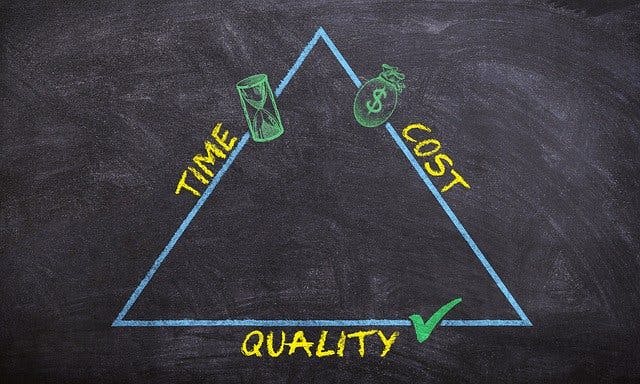If you're looking to get into the world of technical teams, you've likely encountered professionals wearing the titles of Project Manager and Product Manager. At first glance, this can seem like two ways of describing the same job. This is made more confusing by the fact that both job wear the acronym of "PM", and that many companies themselves are a little unclear on the differences, and assign the duties of one job to people with the other title. But there are some critical differences between these two roles, and knowing them will set you up for more success in becoming or dealing with a PM on your professional team.
The Similarities
Both Project Managers and Product Managers are, as it sounds, management level positions within a project team. This means that their primary responsibility is guiding others to the successful completion of a project. But this is where the roles start to diverge. You might even find a team with both a Product and a Project Manager. Let's dig into each one in a little more detail to demonstrate the differences and when you might encounter each on a job.
Project Manager
Project Managers are scheduling masterminds. They keep everyone on track and under budget by breaking down the scope of work into time based deliverables, and then making sure that people are able to deliver as promised. They draft and maintain critical project records, such as Project Charters (the document that states who will be involved in a project's lifespan), scope documents, timetables and schedules, and budgets. They analyze projects for potential risks and find ways to minimize or account for those risks. And then they make sure that everyone sticks to the plan, or come up with a contingency plan when complications such as budget or time overages arise.
This does not necessarily mean bogging teammates down with lots of paperwork and rules... more often than not, it means coming up with a good set of documentation, setting clear expectations with the team, and then maintaining a watchful eye on the time and budget to make sure things are going according to plan. When a project concludes, the project manager will create another set of documents describing what work was done, who was involved, and any lessons learned along the way. These documents become resources as lessons for the successful completion of future projects.
Project Manager as profession was born at Microsoft when they were building the product today known as Excel. (perhaps it is no surprise that Excel is itself a valuable project management tool?) Things were complicated, and a decision was made to appoint someone whose job was to track progress and make sure things stayed under budget. These two tasks are at the heart of the Project Manager role, so if you're someone who loves budgets, spreadsheets, and clean, maintainable documentation, this might be a good career for you. Project Management is a highly structured and technical role. Entry into the field is usually either through being elevated internally within a company or via PMP certification pathways.

Product Manager
Product Managers have many similar functions, but they are more concerned with strategy and vison than budgetary overage spreadsheets. The Product Manager is the person over the creation of a product. They are more often found in an agile development environment, where work iterates over time and the exact scope or budget for the product may not be known in advance. Product Managers are often compared to CEOs of a product. This is true in many ways, but does not reflect the fact that they often lack the sort of unilateral decision making capability that a CEO might enjoy. Rather, Product Managers act as a buffer between the design, engineering/development, and sales teams. They also represent customers and stakeholders at meetings. This means that they are responsible for getting feedback from whoever will be the end user of a product and incorporating that into strategic planning. It also means they will spend time keeping any stakeholders like executive management or whoever else might be ordering and paying for the product's development abreast of how things are progressing. They are the bridge between the conceptual needs of the organization and customer, and the practical requirements of the development and marketing teams.
A Product Manager is responsible for breaking down a product's features into manageable chunks, prioritizing them in order of import to the value creation of the project, and then constantly monitoring with end users and stakeholders to make sure these priorities don't change over time. Product Managers are primarily concerned with value creation for the organization in which they work. It is their job to know whether a super "cool" feature that the development team wants to work on will translate to actual sales and usability of the product, then to weigh the value of its inclusion in the product backlog, and if so, when.
Product Management as a job title was created in 1931 at Proctor and Gamble, when President Neil McElroy (who later became US Secretary of Defense) decided to give managers ownership over particular products' creation. Because the role of Product Manager requires such a wide breadth of skills and is highly visionary, there is no one clear path to becoming one. And the advancement route through the Product Management world often leads later to executive management or founder status. As an example, the current CEOs of Microsoft and Google previously worked as Product Managers.
The Manager Hierarchy
So, going back to the example at the top of this discussion, if you encounter a team with both a Product and Project Manager, who reports to whom? In this case, most likely, the Project Manager reports to the Product Manager. The Product Manager is controlling overall strategy, talking with stakeholders, and coming up with a prioritized road map to product release and lifecycle. And the Project Manager is supervising the schedule, budget, and inspiring team productivity to make sure that things are being produced as planned. Conversely, on a project that does not produce a thing, but perhaps improves upon a process or upgrades a system, a Project Manager may be needed, but not a Product Manager. Both roles are important in today's world of complex project and product releases.
Hopefully now, you have a clearer idea of what each job role entails if you encounter one at your work, and which might be a good fit for you if you are looking to enter the field. Both fields are constantly evolving as the science and practice behind them adapt to a changing global marketplace. If you have any additional questions or feedback about this article, which is part of my @hashnode Technical Writing Bootcamp series, drop me a line below! 👇

